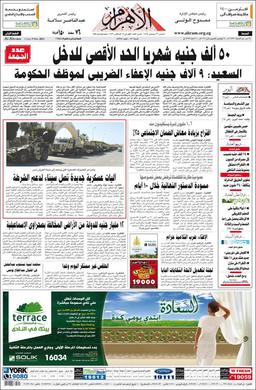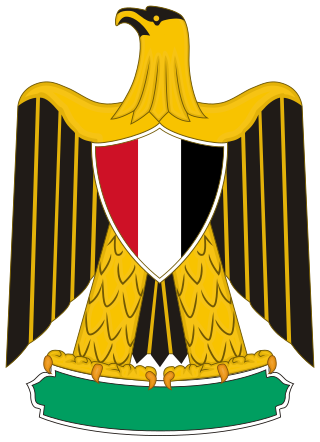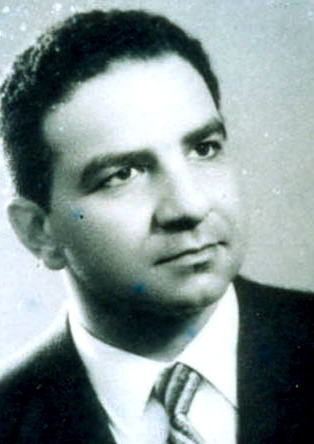Related Research Articles

Muhammad Anwar el-Sadat was an Egyptian politician and military officer who served as the third president of Egypt, from 15 October 1970 until his assassination by fundamentalist army officers on 6 October 1981. Sadat was a senior member of the Free Officers who overthrew King Farouk in the Egyptian Revolution of 1952, and a close confidant of President Gamal Abdel Nasser, under whom he served as Vice President twice and whom he succeeded as president in 1970. In 1978, Sadat and Menachem Begin, Prime Minister of Israel, signed a peace treaty in cooperation with United States President Jimmy Carter, for which they were recognized with the Nobel Peace Prize.

Al-Ahram, founded on 5 August 1876, is the most widely circulating Egyptian daily newspaper, and the second oldest after al-Waqa'i`al-Masriya. It is majority owned by the Egyptian government, and is considered a newspaper of record for Egypt.

Mohamed Hassanein Heikal was an Egyptian journalist. For 17 years (1957–1974), he was editor-in-chief of the Cairo newspaper Al-Ahram and was a commentator on Arab affairs for more than 50 years.

Nasserism is an Arab nationalist and Arab socialist political ideology based on the thinking of Gamal Abdel Nasser, one of the two principal leaders of the Egyptian Revolution of 1952, and Egypt's second President. Spanning the domestic and international spheres, it combines elements of Arab socialism, republicanism, nationalism, anti-imperialism, developing world solidarity, Pan-Arabism, and international non-alignment. According to Mohamed Hassanein Heikal, Nasserism symbolised "the direction of liberation, socialist transformation, the people’s control of their own resources, and the democracy of the peoples working forces."

Mohammed Hussein Heikal was an Egyptian writer, journalist, politician. He held several cabinet posts, including minister of education.

Al Messa is an Arabic daily newspaper published in Cairo, Egypt.
The Naguib Mahfouz Medal for Literature is a literary award for Arabic literature. It is given to the best contemporary novel written in Arabic, but not available in English translation. The winning book is then translated into English, and published by American University in Cairo Press. It was first awarded in 1996 and is presented annually on December 11, the birthday of Nobel laureate Naguib Mahfouz, by the President of the American University in Cairo.

Latifa al-Zayyat was an Egyptian activist and writer, most famous for her novel The Open Door, which won the inaugural Naguib Mahfouz Medal for Literature.

The Arab Nationalist Movement, also known as the Movement of Arab Nationalists and the Harakiyyin, was a pan-Arab nationalist organization influential in much of the Arab world, particularly within the Palestinian movement. It was first established in the 1950's by George Habash with the primary focus on Arab Unity.
Hawaa is a weekly women's magazines published in Cairo, Egypt. The magazine is modelled by other women's magazines in the Arab countries. It was Egypt's first women's magazine, founded in 1954.
Ahmad Hasan al-Zayyat was an influential Egyptian political writer and intellectual who established the Egyptian literary magazine Arrissalah, which is described as "the most important intellectual weekly in 1930s Egypt and the Arab world." Born in the village of Kafr Demira, Talkha, into what was then a peasant family, al-Zayyat studied at Al-Azhar University before taking up legal studies in Cairo and Paris. He taught Arabic literature at American University in Cairo, and for three years in Baghdad, before founding Arrissalah in 1933. In the 1960s he served as the editor of Majallat Al Azhar, monthly publication of Al Azhar University.
Zahira Hafez Abdin, was an Egyptian paediatrician and specialist in rheumatic heart disease, known as the "Mother of Egyptian Medicine." She is also known for her extensive charitable work.
Kamal Rifaat was an Egyptian military officer and one of the members of the Free Officers movement. He held several government posts after the Egyptian revolution in 1952.
Al Ahram Al Iktisadi is a weekly business magazine headquartered in Cairo, Egypt. It is one of the publications produced by Al Ahram Organisation and has several sister publications, including Al Ahram Weekly, Al Siyassa Al Dawliya, Al Ahram Al Arabi and Al Ahram among others.
Al Jarida was a liberal newspaper which was published in Cairo, Egypt, from 1907 to 1915. The paper was the official organ of the Umma Party. It was one of the publications that shaped the Egyptian nationalist culture containing the Westernized elements and was very influential during its existence.

Mohamed Fayek is an Egyptian politician who held various cabinet posts from 1967 to 1971 during the presidency of Gamal Abdel Nasser. He was the minister of national guidance in 1967, the minister of information between 1968 and 1970 and the state minister for foreign affairs between 1970 and 1971. He was also elected as a deputy to the People's Assembly in 1968.

Sharawi Gomaa (1920–1988) was an Egyptian military officer who served in various posts, including governor of Suez, deputy prime minister and minister of interior, during the presidency of Gamal Abdel Nasser. He was part of the May Group who were removed from the office by Anwar Sadat in May 1971.

Sami Sharaf was an Egyptian military officer who held various posts during the presidency of Gamal Abdel Nasser. His public roles ended in May 1971 when he was arrested and then imprisoned by the Egyptian authorities under the presidency of Anwar Sadat.
Sayed Marei was an Egyptian politician who held various posts during the presidency of Gamal Abdel Nasser and Anwar Sadat. He is one of the officials who shaped the agrarian activities in Egypt during the 1950s and 1960s.
References
- 1 2 3 4 5 6 Dominic Coldwell (2003). Egypt's 'Autumn of Fury': The Construction of Opposition to the Egyptian-Israeli Peace Process between 1973 and 1981 (PDF) (MPhil thesis). St Antony’s College, University of Oxford. Archived from the original (PDF) on 18 April 2016.
- 1 2 "Michel Kamel Papers". International Institute of Social History. Archived from the original on 29 October 2019. Retrieved 3 November 2021.
- 1 2 3 4 Reem Abou El Fadl (2016). "Nasserism". In Amal Ghazal; Jens Hanssen (eds.). The Oxford Handbook of Contemporary Middle-Eastern and North African History. Oxford: Oxford University Press. pp. 224–247. doi:10.1093/oxfordhb/9780199672530.013.18. ISBN 9780199672530.
- ↑ Hannah Davis Taieb (1998). "The Girl Who Found Refuge in the People: the Autobiography of Latifa Zayyat". Journal of Arabic Literature. 29 (3): 212. doi:10.1163/157006498x00055.
- 1 2 Didier Monciaud (2000). "Struggling and Surviving: The Trajectory of Sheikh Moubarak Abdu Fadl. A Historical Figure of the Egyptian Left". In Cynthia Nelson; Shahnaz Rouse (eds.). Situating Globalization. Views from Egypt. Biefeld: transcript Verlag. p. 172. doi:10.14361/9783839400616. ISBN 9783933127617.
- ↑ Pradeep Sen (1981). "Party system under Sadat. Change or continuity?". India Quarterly . 37 (3): 415. JSTOR 45071641.
- ↑ "Al-Tali'a: tariq al-munadilin ila al-fikr al-tawri al-mu'asir [Al-Talia; the Vanguard]". Abe Books. Retrieved 3 November 2021.
- 1 2 3 4 Yasmine Ramadan (2012). "The Emergence of the Sixties Generation in Egypt and the Anxiety over Categorization". Journal of Arabic Literature. 43 (2–3): 409–430. doi:10.1163/1570064x-12341242.
- ↑ Yasser Mohamed Elwy Mohamed Mahmoud (2009). A political economy of Egyptian foreign policy: State, ideology, and modernisation since 1970 (PhD thesis). London School of Economics and Political Science. p. 129.
- ↑ Rebecca C. Johnson (2021). "Cross-Revolutionary Reading: Visions of Vietnam in the Transnational Arab Avant-Garde". Comparative Literature. 73 (3): 361. doi:10.1215/00104124-8993990.
- ↑ Patrizia Manduchi (2015). "Students and Dissent in Egypt: From the Khedival Period to the Protests of 1968". Oriente Moderno. 95 (1–2): 140. doi:10.1163/22138617-12340078. JSTOR 44289938.
- ↑ Ahmed Abdalla (2008). The Student Movement and National Politics in Egypt, 1923-1973. Cairo; New York: American University in Cairo Press. pp. 109, 253. ISBN 978-977-416-199-5.
- 1 2 Fawaz A. Gerges (2018). Making the Arab World: Nasser, Qutb, and the Clash that Shaped the Middle East. Princeton, NJ; London: Princeton University Press. p. 289. ISBN 978-0-691-16788-6.
- ↑ Yehoshafat Harkabi (1970). "Liberation or genocide?". Society . 7 (9–10): 63. doi:10.1007/bf02804064.
- 1 2 Judith Nottingham (1973). A study of the ideology of Palestinian Arab nationalism since 1948 (MA thesis). Durham University. p. 79.
- ↑ Michael C. Hudson (Spring 1972). "Developments and Setbacks in The Palestinian Resistance Movement 1967-1971". Journal of Palestine Studies . 1 (3): 81. doi:10.2307/2535867. JSTOR 2535867.
- ↑ Sabry Hafez (2017). "Cultural Journals and Modern Arabic Literature: A Historical Overview". Alif: Journal of Comparative Poetics (22): 22–23. JSTOR 26191813.
- ↑ Hugo Darroman (2021). "Towards a decentered history of Palestinian revolutionary cinema ? Case study of the film Tall El Zaatar in the audiovisual archives of the Italian Communist Party". Regards. Revue des Arts du spectacle (26): 4.